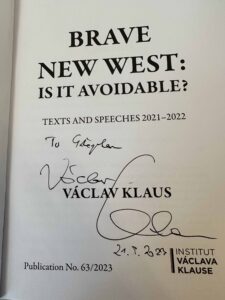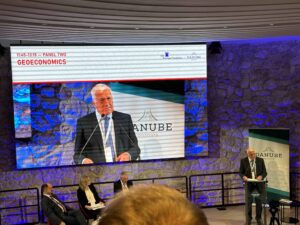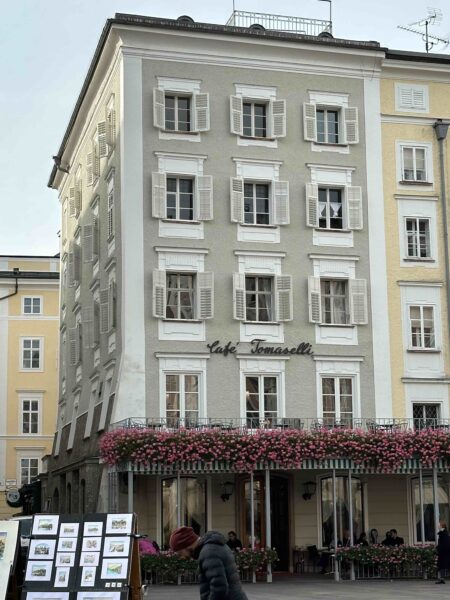SALZBURG, Austria, October 19—Back in August of 1990 I attended my first-ever meeting of the Mont Pelerin Society in Munich, West Germany, not far from my current temporary location. I was still a sluggish graduate student at the time, long past when I should have completed my dissertation, but somehow I had contrived to snag a fellowship to attend, and present a paper whose precise topic I don’t now recall, except for the fact that I included a couple long paragraphs trying to draw inverse lessons from Rousseau’s draft constitution for Poland, mostly to be mischievous because Rousseau doesn’t really fit well with the classical liberal tradition of MPS.
Coming less than a year after the fall of the Berlin Wall and the sudden opening up of Eastern Europe, it was a momentous meeting, regarded by many participants who had been attending MPS meetings from the beginning in the late 1940s as one of the most significant in the Society’s storied history. Friedrich Hayek, by then in his early 90s, was not able to attend, but Milton Friedman and George Stigler were both present, along with Ronald Coase and Gary Becker, who won their Nobel Prizes in economics the next two years, taking their place alongside Friedman, Hayek, and Stigler. I also made the acquaintance of Ralph Harris (Lord Harris of High Cross), Arthur Selden, Oliver and Shirley Robin Letwin, Linda Whetstone, and several other British thinkers who were central to Margaret Thatcher’s rise and rule. (In later MPS meetings I got to know Kenneth Minogue and Maurice Cranston, too.)
In other words, a lineup of true titans. But the speaker who stole the show was Vaclav Klaus, who had become the finance minister for Czechoslovakia in the fall of 1989 immediately after the Communists were chased out of power. Klaus was a well-known free marketeer. Among other aspects of his career, he spent a year as a graduate student in economics at Cornell University in 1969, where he likely met a young faculty member named Thomas Sowell, and also witnessed the radical left meltdown at Cornell that year.
As a government minister with actual power to help make a rapid transition to a functioning democracy and a market economy, rather than just an academic or intellectual, his remarks had special weight, and the usual low murmur of the large conference hall fell totally silent as this soft-spoken man began to speak. There was considerable uncertainty among MPS members at that moment, because no one knew how things would fall out. The question of German reunification was still a matter of great concern. Klaus offered definitive and confident direction. It was a powerful demonstration that sometimes it is the soft-spoken by thoughtful man who can command an audience most effectively.
At a remove of 33 years I do not now recall Klaus’s specific arguments, but I remember two dominant general points: first, there should be no compromise in sweeping away the socialism of the previous era, but second, a note of profound magnanimity, in which he said that we should not be seeking retribution against former Communist functionaries in the eastern nations. He said we should put the past behind us lest we lose focus on a brighter future. His effect on the distinguished audience was evident; his gravitas and presentation were deeply moving.
Klaus later went on to become president of the Czech Republic, and helped to manage the amicable split-off of Slovakia into its own country. He clashed often and was a rival with the other great Vaclav of the Czech freedom story—Vaclav Havel—because Havel was friendlier to “social democracy” welfare state measures, and opposed the privatization of state-owned companies. In later years Klaus became an outspoken critic of the centralizing and bureaucratizing tendencies of the European Union, and he remains a prominent critic of the climate change cult.
Thus it was a treat to see Klaus up close and in person again shortly after I arrived in Budapest last month. He spoke at the Danube Institute’s annual Geoeconomics Conference. Now eighty-two years old and long retired from active politics, Klaus is more soft-spoken, but more ferocious in his message than ever. I scribbled away in my reporter’s notebook as he delivered one bracing declaration after another.
I had the opportunity to speak with him at length after he finished, where we reminisced about the 1990 MPS meeting (“A very important meeting,” he said), and he not only gave me a signed copy of his latest collection of essays, Brave New West: Is It Avoidable?,” but also handed me the prepared text for his presentation, so I don’t need to rely entirely on my notes to pass along some of his gems:
“I did not expect things to disintegrate so quickly after 1990. . . I come from a small country with no geopolitical ambitions, from a country that, by joining the European Union, lost its short era of independence and sovereignty which we enjoyed after the collapse of the Soviet empire. Europe is, however, a very weak source of identity. . . [Klaus boldfaced this sentence in his prepared text, along with the others that follow below.]
“Let me focus my comments on the West. I fear for its fate. It seems problematic and unwarranted now. In our institute in Prague, we have just completed a small book, a collection of essays, with the title The Self-Destruction of the West. . . I repeat, it is not about the destruction of the West; it is about its self-destruction. This slow, but powerful process is not a consequence of an external shock, pressure, or threat. We are convinced it is a self-made, self-imposed, self-inflicted injury. It has not been imported from the East or the South. It has not been imposed on us from somewhere. Neither is it the outcome of a diabolical plan of a group of crazy conspirators who want to destroy the world as we know it.
“This process seems to be the consequence of an endogenous mechanism. It is the outcome of an evolutionary process based both on ideologies and interests (as always in human history). The Western society has been intentionally getting rid of its basic pillars which were the source of its success and prosperity in the past.
“Individual freedom and free markets have become disgraced. No one is defending them. Because of the strength of currently dominant ideologies, their defense is considered politically incorrect, more or less reactionary. To advocate them, as I recently tried at a major international conference, is not welcome, even though many participants congratulated me—silently, ex post—for having the courage to raise these issues. Some of us used to live in such a world for a very long time. It asked for courage and resolution to express criticism of the official ideology in the Communist era. I must say we didn’t expect to return to something similar to that so quickly. . .
“The new ideologies of aggressive environmentalism, multiculturalism, genderism, NGOism, or in the field of economics of such a nonsense as the extreme version of post-Keynesianism called the New Monetary Theory have been promoted, heralded, and, consequently, more or less smoothly accepted as a new orthodoxy. This is beyond my comprehension. . .
Here Klaus departed from his prepared text to mention the American economist Joseph Stiglitz, whom he called “my arch-enemy.” Then he pivoted to the climate cult:
“Today any debate with the Greens is impossible. They and their apologists in all political parties don’t pay attention to arguments. The penalty when you openly disagree with them is similarnow to that we experienced in the late Communist era—you are not promoted and you don’t get the government grants. . .
“The economy is once again overregulated, with all kinds of external ‘standards’ imposed upon it. A specific role is played by ridiculous green imperatives, recently under the banner ESG (Environmental, Social, and Governance). Running corporations for the benefit of shareholders is out. It doesn’t mean anything but a fundamental systemic change. People still blindly believe they live in a capitalist system and a market economy. . . The managerial revolution of the 1950s has been completed, The managers and technocrats have become, to some people surprisingly, the main fighters for a non-economic way of thinking. This should not be surprising. They have totally different interests than the owners.”
This last bit is clearly derivative of James Burnham, and the “principal-agent” problem. He closed thus:
“We, who are here, instinctively feel that the world we live in—and its ‘geoeconomics’—is not only strange but fundamentally wrong. We should be saying that loudly.”
 During the lively discussion period that followed Klaus said that what we need now is an aggressive “de-subsidization” of industry (especially the green energy industry). He also suggested that we make a distinction between “globalization”—that is, liberalized trade that generally benefits everyone—and “globalism,” the ideology that sees trade flows and overseas investment as something to be politically managed by the multinational elites such as the World Economic Forum. Klaus prefers to say “internationalization” rather than globalization as a way of avoiding the pernicious conflation.
During the lively discussion period that followed Klaus said that what we need now is an aggressive “de-subsidization” of industry (especially the green energy industry). He also suggested that we make a distinction between “globalization”—that is, liberalized trade that generally benefits everyone—and “globalism,” the ideology that sees trade flows and overseas investment as something to be politically managed by the multinational elites such as the World Economic Forum. Klaus prefers to say “internationalization” rather than globalization as a way of avoiding the pernicious conflation.
About Francis Fukyuama’s famous “end of history” thesis that predicted benign classical liberalism sweeping the globe, Klaus said Fukuyama was “misplaced and drunk.”
Despite this sober assessment of where we are, his last word was: “Optimism is an obligation, but we must be aware of what is going on.”
P.S. Power Line’s temporary Salzburg bureau location, Cafe Tomaselli:



Notice: All comments are subject to moderation. Our comments are intended to be a forum for civil discourse bearing on the subject under discussion. Commenters who stray beyond the bounds of civility or employ what we deem gratuitous vulgarity in a comment — including, but not limited to, “s***,” “f***,” “a*******,” or one of their many variants — will be banned without further notice in the sole discretion of the site moderator.